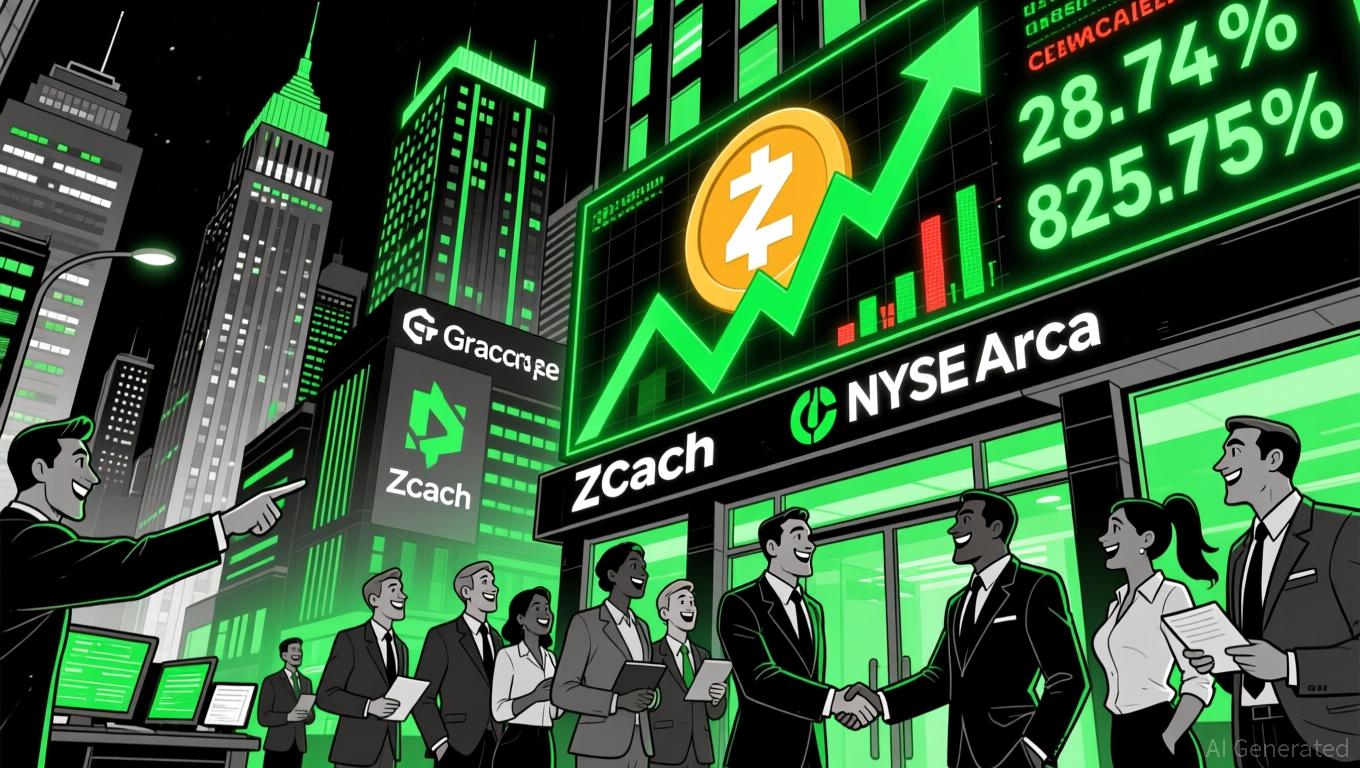ZEC drops 1.16% after Grayscale submits application for inaugural U.S. Zcash ETF
- Grayscale files first U.S. Zcash ETF application, seeking to convert its Zcash Trust into a spot ETF (ticker ZCSH) with Coinbase and BNY Mellon as partners. - ZEC's 825% 12-month price surge reflects growing institutional/retail demand for privacy-focused crypto, driven by Zcash's hybrid security-privacy architecture. - Reliance and Templar Protocol expand ZEC exposure through treasury allocations and first native ZEC borrowing on Solana , enhancing institutional adoption. - ETF approval faces regulatory
Grayscale Investments has submitted an application to the U.S. Securities and Exchange Commission to transform its Grayscale
As of November 25, the Grayscale Zcash Trust managed about 394,400 ZEC, with an estimated value of $199.2 million. Grayscale has a proven history of successfully converting its trusts into ETFs, as seen with its recent Dogecoin Trust, which transitioned to an ETF in roughly three months.
This filing comes at a time when ZEC’s price has seen significant gains in recent months. Over the past 30 days, ZEC has climbed by 28.74%, and over the last year, it has soared by 825.75%.

In addition to Grayscale’s move, Reliance Global Group (RELI) has broadened its involvement with Zcash. On November 26, the company revealed an increased investment in ZEC as part of its Digital Asset Treasury (DAT) strategy. Reliance pointed to ZEC’s Bitcoin-derived security and privacy options as primary factors for its allocation, emphasizing that these features align with its compliance-driven digital asset approach. This decision signals the company’s confidence in Zcash’s long-term value as a privacy-focused asset.
Templar Protocol has also advanced ZEC’s utility by enabling the first direct ZEC-backed borrowing. The protocol lets users use native ZEC as collateral to borrow stablecoins on
ZEC’s price has recently shown volatility, dropping 5.4% in the past week despite a 5% uptick on November 26. While the token has faced short-term downward pressure, it remains in a broader upward trend. Some analysts caution that prices could decline further if market sentiment shifts or if the ETF approval is delayed. Others maintain that demand for privacy tokens remains robust, especially among institutions seeking diversified exposure.
Grayscale’s application highlights the increasing acknowledgment of Zcash’s role in mainstream finance. The company’s legal team stressed ZEC’s significance in a diversified digital asset portfolio and its relevance in the changing regulatory environment. The ETF conversion process could take several months, and for now, share creation and redemption will likely be limited to cash transactions until regulatory guidelines become clearer.
In conclusion, the potential conversion of the Grayscale Zcash Trust into a spot ETF marks a significant step for ZEC’s adoption in traditional finance. Alongside Reliance’s treasury strategy and Templar’s new borrowing mechanism, these developments underscore Zcash’s growing presence in institutional and regulated financial markets. Investors and market watchers will closely follow the SEC’s review and ZEC’s price movements as the asset continues to gain acceptance in the broader investment landscape.
Disclaimer: The content of this article solely reflects the author's opinion and does not represent the platform in any capacity. This article is not intended to serve as a reference for making investment decisions.
You may also like
LUNA Remains Unchanged in 24 Hours as Annual Decline Hits 82% During Market Consolidation
- LUNA remains flat at $0.0747, with a 4.04% 7-day gain but an 82% annual drop, reflecting prolonged bearish trends. - SpaceX’s $105.4M BTC transfer and Tesla’s $1B BTC holdings highlight institutional crypto strategies, though indirect to LUNA’s trajectory. - South Korea’s Nuri rocket success underscores private-sector collaboration in advancing space programs, mirroring global tech trends. - LUNA’s prolonged bearish trend and market consolidation persist amid strategic institutional moves, with recovery
Bitcoin Updates Today: Tether’s Bitcoin Investment Compared to Stability: S&P Raises Concerns Over Unstable Peg
- S&P Global Ratings downgraded Tether's USDT to "weak" due to 5.6% Bitcoin exposure exceeding its 3.9% overcollateralization threshold and limited reserve transparency. - Tether CEO defended the model, citing no redemption refusals and $10B 2025 net profit, while S&P warned Bitcoin/gold price drops could trigger undercollateralization risks. - Market turbulence saw $3.5B Bitcoin ETF outflows and $9.9B Bitcoin holdings, with Tether expanding into gold producers and crypto lending despite regulatory scrutin
Ethereum Updates Today: Blockchain’s Cleanliness Transformation: Privacy Moves from a Choice to a Necessity
- Ethereum co-founder Vitalik Buterin donated to privacy-focused projects Aztec Network and Kohaku, signaling blockchain's shift toward data protection as a core priority. - The Ignition Chain and Kohaku framework aim to address data breaches like SitusAMC by enabling private transactions via zero-knowledge proofs and protocol upgrades. - Ethereum's Fusaka upgrade (2025) and growing $1.2 trillion blockchain messaging market highlight privacy's rising economic and technical importance in decentralized syste

Australia’s Cryptocurrency Regulations Set to Unlock $24 Billion in Value While Enhancing Investor Protections
- Australia introduces 2025 Digital Assets Framework Bill to unlock $24B productivity gains while imposing strict client asset safeguards. - Legislation creates two new crypto financial product categories under Corporations Act, requiring AFSL licensing for platforms and tokenized custody services. - Exemptions for small operators (<$10M volume) balance innovation with regulation, aligning with global trends like U.S. GENIUS Act and SEC's Project Crypto. - Industry debates regulatory proportionality as Aus
